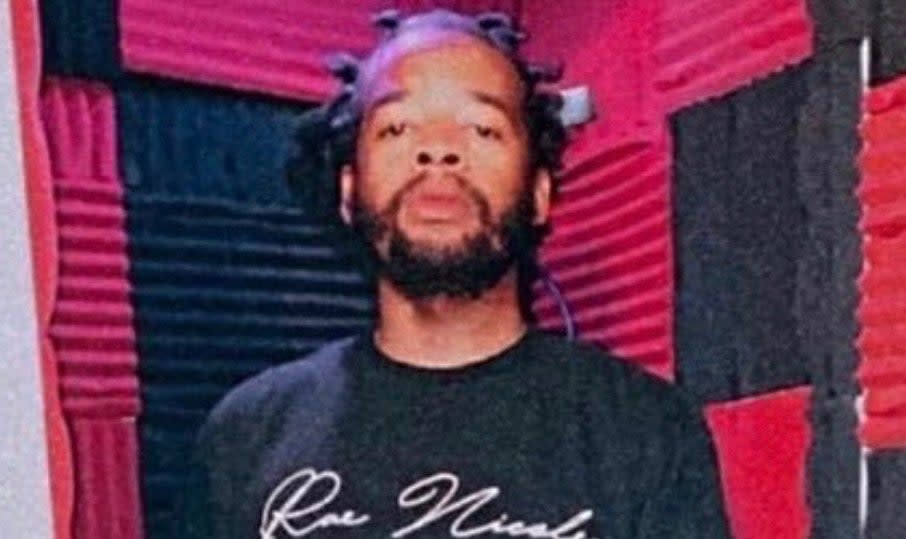George Floyd anniversary: Mentally-ill Ashton Pinke, who police say was too dangerous to taser, killed one year on

Police have killed at least 229 Black people among a total of 426 people of colour since former Minneapolis police officer Derek Chauvin murdered George Floyd on 25 May, 2020. Each case is different, but many share core similarities: quick encounters, for low-level infractions, met with deadly force, leaving families and communities with unanswered questions.
At the apartment complex in Mesquite the air was suddenly filled with the sound of gunshots and then a woman’s screams.
When people looked outside, they saw a man lying on the ground. Later they would watch paramedics trying in vain to revive him.
The man, Ashton Pinke, had a history of mental health problems. Police had been called to the Audobon Park Apartments by his girlfriend, who dialled 911 before hanging up the phone.
A recording of the call made to the dispatcher on May 4 contains the sounds of a disturbance.
As it was, soon after police arrived, the 27-year-old ended up being shot dead by police, after he ran at them. Police say he was carrying a club and a knife, but his family insist the troubled young man was carrying a walking stick, and a craft knife.
“There was a lady screaming and there was a guy laying on the ground and the paramedics looked like they were trying to resuscitate him,” Rico Bell, a neighbour who witnessed the aftermath of the shooting, told NBC News.
Body camera footage recorded by one of the three officers called to the scene showed officers approaching the apartment where Mr Pinke lived with his girlfriend and his child with their weapons drawn.
They can be heard shouting several times at the young man, apparently standing in a doorway: “Don’t do it”. It also records the man shouting in response: “Shoot”.
Justin Moore, a lawyer for the family told The Independent there was no reason for the incident to have ended as it did, and that officers had been told the man they were confronting had mental health problems. He says it is another case of white police officers showing little concern for the wellbeing of Black suspects, particularly those suffering from mental health problems.
“The two officers who responded to Mr Pinke have completely disregarded the fact that he was suffering from a severe mental illness,” he says. “And they also disregard the fact they had actually been trained to deal with someone experiencing those extraordinary circumstances.”
He adds: “I think it highlights the lack of concern when it comes to Black males and Black women who might be experiencing mental health issues.”
The family said the young man had a long history of struggling with mental health issues. One uncle said he had been diagnosed with bipolar schizophrenia and took medication to help control the condition.
An aunt, Precious Wafer, told the local Fox News affiliate KDFW-TV that the officer ought to have been able to resolve the situation without the young man losing his life.
“Why was deadly force used instead of the theories, the methodologies that we know are effective when dealing with people with mental illness,” she said.
The city of Mesquite, which is located 15 miles east of Dallas, Texas, has a population that is 25 per cent African American. The previous police chief, Charles Cato, made an effort to hire more Latino, Black and women officers.
This year, the force, which was established in 1952, made history with the promotion of its first Black sergeant, Torrey Rhone.
“I grew up in Los Angeles in the ‘80s and ‘90s and, you know, it was a very tumultuous time. I lived through Latasha Harlins being killed at the liquor store. I lived through the Rodney King incident. I lived through the 92 riots,” Mr Rhone, who joined the force in 2007, told a local television channel.
As it was, the promotion of the Black officer came the same month as the fatal shooting of Mr Pinke, who was shot five times by officers who had more than 20 years experience.
Through their lawyer, the family declined to speak to The Independent and the city police force did not respond to enquires.
The force has claimed that the young’s man’s carrying of a walking cane and a box-cutter knife gave adequate reason for officers to shoot with him live ammunition, rather than use the Tasers they were carrying.
“The Taser is a useful tool to law enforcement in certain situations. In this incident, it was not,” Lt Stephen Biggs said at a press conference.
“The Taser is a less-lethal device. The suspect was wielding two deadly weapons, and we’re not countering two deadly weapons with a less-lethal device.”
Mr Moore said police could have done much better. Yet he says the incident has its roots in an older, more deeply ingrained malaise within the nation.
Asked if this was a systemic issue, he said: “I think it’s much deeper than systemic issues. I think it goes to problems with the soul of this country. For decades, Black people have been over-criminalised, they have essentially been condemned to criminality due solely to their blackness. And I don’t know if it’s a system if it’s a systemic fix, or if it’s something that needs to happen in a much deeper way.”
He added: “Systems are only tools for people, right? So if the people still harbour these sentiments, you can change the system as much as we want, but the same consequences are going to occur, which is the death of Black males and Black women who have been condemned to criminality.”
Read More

